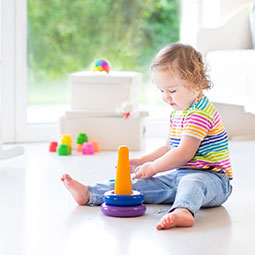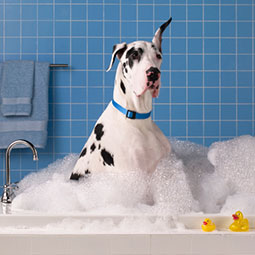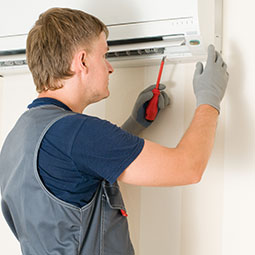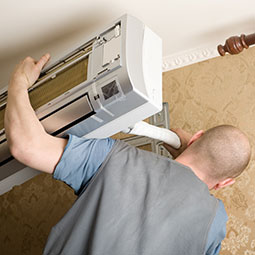How to tell if your building is making you sick.
Posted on March 21, 2019 at 11:30 AM

Sick building syndrome is a specific designation given to dwellings deemed hazardous based on criteria by the U.S. Centers for Disease Control and Prevention (CDC). A building is diagnosed as “sick” by the CDC when 20% of the workforce presents these symptoms:
- Irritated eyes
- Hoarseness
- Headaches
- Dry, itchy skin
- Faintness
- Unsettled stomach
- Heart palpitations
- Miscarriages
- Trouble breathing
- Nosebleeds
- Chronic fatigue
- Difficulty concentrating
- Tremors
- Swollen appendages
- Cancer

More often, people exhibiting symptoms to unhealthy indoor environments aren’t in mortal danger but do need to improve how they feel. It starts with dust.
The average, six-room house accumulates an average of 40 lbs. of dust every year, according to the Environmental Protection Agency.
Dirt, pollen, soot, and other airborne particles from outside make up two-thirds of the dust you find in your home, according to Science Focus magazine. The remainder is carpet fuzz, clothes fibers, and pet hair.

Most people are allergic to the dust mites living off the dust. However, a study of dust by George Washington University found the danger can be much greater. Dust samples tested in the study contained up to 45 potentially toxic chemicals commonly found in such consumer products as vinyl flooring, personal care, cleaning products, and building materials.
The study showed 10 harmful chemicals in 90 percent of the dust samples, including cancer-causing phosphates used as flame retardants, pesticides, and plasticizers.
Dirt, pollen, soot, and other airborne particles from outside make up two-thirds of the dust you find in your home, according to Science Focus magazine. The remainder is carpet fuzz, clothes fibers, and pet hair.
Air Flow

Cleaning and vacuuming the dust you see settled on furniture and carpets helps get it out of your home. However, the smallest particles, and the most dangerous, go airborne and can stay suspended in the air for days!
When it comes to air flow, most buildings in Massachusetts fall somewhere in the spectrum of too much air flow and too little air flow.
On one side, too much air flow brings in pollutants like dust and pollen from outside. Also, 98% of water vapor moves through buildings in the air, the EPA says, and moisture leads to mold. These drafts typically happen around windows, doors, HVAC vents, and poorly insulated exterior walls.
On the opposite side, too little air flow can make a building stuffy and trap smells and moisture inside. Common signs of stagnant air flow are odors hanging around, a mildew smell, and humidity.
Massachusetts homeowners can receive a free home energy audit from the MassSave. One of the many services includes a blower door test, which determines the airtightness of your home. It’s quick and simple, and the results may surprise homeowners with newer homes.
Advances in insulation technology makes gas furnaces, heat pumps, and other heating & cooling equipment more efficient. But, it’s also made some newer dwellings too air tight, which means the moisture becomes trapped inside without air flow.
Start with your filter.
For drafty buildings, your first project is to seal up the leaks. Here’s a good article for getting started on that task.
Once you limit the unregulated airflow, look into buying the best filter for your needs. Skip down below to read more on that.
You may think you have clean air flow because you have central air conditioning, but take a moment to check the filter. A clogged filter can restrict airflow in an otherwise well-functioning HVAC system. Most experts and manufacturers recommend checking your filter once a month. Many ductless mini-split systems come with washable filters.
Consider asking an HVAC technician to show you how to do it the first time or inquire about service contracts where the contractor changes the air filter.
Choosing a filter

The best air filter for your HVAC system will be produced by the manufacturer. Top-rated HVAC equipment manufacturers offer a broad range of affordable filters for to clean specific pollutants from:
- Office equipment
- Cleaning products
- Carpets and furnishings
- Perfumes
- Fungus, mold, and bacteria
- Pet dander
- Nature (pollen, insects, and rodents)
- Dampness
- Volatile organic compounds (VOC)
The most important detail to remember about a filter is to change or clean it every month.
Moisture control

28% of homes in the U.S. rated as unhealthy report problems with mold, mildew, and/or rot, according to the EPA.
Mold spores in the air can colonize and grow in 24–48 hours under these 5 conditions:
- Moisture
- Oxygen
- Warmth
- Darkness
- A food source, like wood, drywall, cotton, etc.
Obvious issues like leaks in a foundation or a failed plumbing system can cause a lot of moisture in a building and result in significant mold problems and other issues. More often, moisture builds up in more subtle ways to decrease air quality in major ways.
One of the most popular and cost-effective ways to control humidity is to buy a ductless mini-split system. These versatile and easy-to-install systems enable you to dehumidify, heat, air condition, and filter pollutants in individual rooms without ductwork. Since a single heat pump can handle multiple air handlers, it’s a low-cost, energy-efficient solution for homes that are too tight and need improved air quality.
Expanding an existing central air conditioning system is also a solution for some buildings. However, the project may require tearing into walls and ceilings to install and connect ductwork, which adds to the budget.
Conclusion
Pollutants can be up to 5x higher indoors than outdoors, according to the National Institute for Occupational Safety and Health.
There are a lot of variable factors contributing to the indoor air quality of your home and workspace, from under-performing heat pumps to dirty filters. You can eliminate many of the root causes of sick building syndrome and other air quality hazards by optimizing the temperature, humidity, and air flow in a building.
To fully understand the HVAC system your home, office, or commercial space needs, hire an HVAC contractor near you with longevity in the business community and factory-certified technicians. Follow this link for guidance on hiring the best HVAC contractor near you.
If this article is useful to you, please Like it below. If you know someone who can benefit from it, please Share it.
If your question isn’t answered here, contact the Pierce Refrigeration team and one of our experts will guide you in finding your solution.
Need 24-7 emergency service? Looking for advice on improving your everyday air quality and comfort at home and at work?
Contact the friendly staff at Pierce Refrigeration at
800-696-1088
info@piercerefrig.com
The Pierce team focuses entirely on heating, air conditioning and indoor air quality. We understand these technologies, work with them every day, and our people are factory-trained and fully certified.
Visit our websiteGet the best summertime performance from your central air and mini-split systems.
Read more.
Do I really need an AC tuned-up?
Read more.
Do you really need a furnace tune-up?
Read more.
Telephone
Toll-free: 800-696-1088508-586-1088
617-698-1272
After Hours and Weekend Emergency
781-961-6463
Email
info@piercerefrig.com
Mailing Address
439 East Center Street
P. O. Box 40
West Bridgewater, MA 02379
Website
www.piercerefrig.com